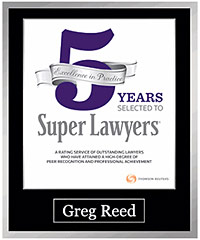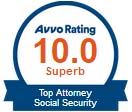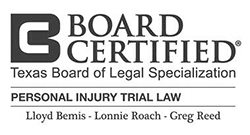Epilepsy and qualifying for Disability Benefits
Can I get disability benefits if I am suffering from the effects of a seizure disorder such as epilepsy?
Author: Attorney Greg Reed
Updated: 10/19/2023
150,000 Americans are diagnosed each year with epilepsy; and it’s the fourth most common neurological disease, affecting people of all genders, races, and ages.
Epilepsy is a brain disorder that causes recurring seizures. Symptoms vary widely, and many cases are controlled through medication; however, if you have severe and frequent seizures, you may qualify for Social Security Disability benefits.

If you are suffering from the effects of a Seizure Disorder such as Epilepsy and have been denied disability don’t give up, almost 70% are denied initially! Just call 512-454-4000 for a free, no obligation consultation to learn what your options are.
A seizure is a sudden burst of electrical activity in the brain that may cause changes in a person’s movements, levels of consciousness, and behavior.
Having one seizure does not mean you have epilepsy. You must have two or more unprovoked seizures at least 24 hours apart that don’t have a known cause to be diagnosed with epilepsy. An unprovoked seizure has no known cause while a provoked seizure is triggered by a specific event such as a stroke or brain injury.
There are two main types of seizures: focal onset and generalized.
Focal onset seizures start in one area of the brain while generalized seizures affect all areas of the brain. There are three types of focal onset seizures:
- Focal onset aware seizures. The person does not lose consciousness during the seizure which usually lasts less than two minutes, but they may be unable to respond to people while the seizure is occurring. They may have difficulty speaking, involuntarily move an arm or leg, or see flashing lights.
- Focal onset impaired awareness seizures. (Also known as focal dyscognitive seizures.) The person may lose consciousness or experience a change in consciousness.
- Focal onset seizures that secondarily generalize. These seizures start in one part of the brain and spread to other regions of the brain. The person may have convulsions or muscle spasms.
Symptoms vary depending on the type of seizure and can affect any brain process.
The most common symptoms include:
- Involuntary movements, especially of the arms and legs;
- Staring into space;
- Stiffening then loosening of muscles;
- Loss of consciousness;
- Rapid eye blinking;
- Confusion;
- Nausea; and
- Sweating.
These symptoms can certainly effect an individual’s ability to maintain employment.
Can I qualify for SSDI if I have epilepsy?
Social Security has created a manual called the Blue Book which lists medical conditions Social Security considers disabling and may automatically qualify for benefits.
Epilepsy is listed under Section 11.02, but because epilepsy can be controlled by medication in most cases, to qualify, you must be able to prove that frequent seizures interfere with your work and daily activities even though you are taking anti-convulsive medications as prescribed by your doctor. Section 11.02 recognizes two types of seizures: Generalized tonic-clonic (grand mal) seizures and dyscognitive seizures.
To qualify under this listing, you must be able to document that you experience the following:
- Generalized tonic-clonic seizures, occurring at least once a month for at least 3 consecutive months.
OR - Dyscognitive (focal) seizures, occurring at least once a week for at least 3 consecutive months.
OR - Generalized tonic-clonic seizures, occurring at least once every 2 months for at least 4 consecutive months: OR
- Dyscognitive (focal) seizures, occurring at least once every 2 weeks for at least 3 consecutive months.
For C and D, in addition to experiencing seizures, you must also have a marked limitation in ONE of the following. (A “marked” limitation seriously interferes with your ability to perform a task.)
- Physical functioning, such as standing, balancing, using arms and hands;
- Understanding, remembering, or using information;
- Interacting with others;
- Concentrating, persisting, or maintaining pace; or
- Controlling emotions and behaviors in the workplace.
Your will need to provide Social Security with the following medical evidence:
- Diagnosis of epilepsy
- Statement from your doctor regarding the nature of your seizures and frequency
- Detailed description of a typical seizure
- Record of seizures
- Results of an EEG
- Treatment history, including medications and other treatments and your responses
- Descriptions of your seizures by family, friends, co-workers
The more information you can provide, the better your chances that your claim will be approved. Here are a few other actions you can take to assure that your claim is approved:
- Try to see a doctor when a seizure occurs.
- Keep a diary of seizure episodes.
- Keep your family, friends and co-workers informed about your medical condition. Social Security may call your employer, family and friends and ask questions about your medical condition.
- Take prescribed medications and follow treatment. If you don’t, Social Security may presume that you would not have seizures if you did take medication and followed your doctor’s recommendations and deny your application.
If you don’t meet Social Security’s listing, but epilepsy interferes with your capabilities to an extent that there are no jobs you can safely perform, you may be eligible for a Medical-Vocational Allowance.
Social Security will consider your medical condition and also your age, education, work skills, restrictions ordered by your doctor, and whether or not you can drive. Social Security does not expect you to work in a job where you are at risk to yourself or others if you have a seizure. If Social Security decides you cannot do your old job or don’t have the skills to perform a new job, you may be approved for a Medical-Vocational Allowance.
If you are 55 or older or have another medical condition you may get approval.
Social Security follows a set of rules to determine when the agency expects an applicant to learn a new job.
Applicants who are 55 or older often fall under a grid rule, which means they are not expected to learn a new job. For example, a 55-year-old applicant with no transferable skills might be found disabled. If you can’t go back to your old job, and you don’t have the skills to learn a new one, Social Security will likely grant you disability benefits.
If you have another medical condition, you may also be eligible for Social Security Disability benefits.
People with epilepsy tend to have more physical problems from injuries related to seizures, as well as anxiety and depression. One disorder alone may not meet the criteria of an impairment as stated in Social Security’s Blue Book, but if you have more than one medical condition, Social Security must consider how those health issues combined limit your ability to hold a job and perform necessary daily tasks.
If you are suffering from Seizure Disorder such as Epilepsy and have been denied disability don’t give up, almost 70% are denied initially! Just call 512-454-4000 for a free, no obligation consultation to learn what your options are. Have some questions? just give us a call, we love to help folks just like you!
Social Security also has basic financial requirements.
You must satisfy some basic financial requirements before you are eligible for Social Security disability benefits.
You must: 1) have a disability that has lasted or is expected to last 12 months; and 2) you must have worked in a job where you paid Social Security taxes long enough and recently enough; and 3) you must not earn more than Substantial Gainful Activity (SGA), which is $1,550 per month in 2024 for nonblind applicants and $2,590 per month for blind applicants.
What if I don’t qualify for SSDI?
If you haven’t worked long enough to earn enough work credits, or if you earn too much income, you may be eligible for disability benefits through another Social Security program, such as Supplemental Security Income (SSI), or from a long-term disability insurance plan through your employer or a privately purchased policy.
SSI is a program that pays monthly benefits to people with limited income and resources who are disabled, blind, or age 65 or older. SSI is based on income instead of work credits, and is financed by general funds of the U.S. Treasury.
I have long-term disability insurance – should I file a claim?
You should file a claim as soon as you become disabled.
Long-term disability insurance (LTD) is coverage that protects your income if you are unable to work due to illness or injury and is purchased as part of a group employment plan or privately through an insurance company. Policies pay between 50-60% of your salary and benefits continue until you return to work or for the number of years stated in the policy. However, LTD coverage is good only as long as you are employed, so do not quit your job before you file a claim, and be sure to check your policy’s definition of “disabled” as each policy will state the definition of “disabled” which is in use. Additionally, be aware that long-term disability insurance companies can require a claimant to also apply for SSDI.
How do I file for Social Security Disability benefits?
You can apply for Social Security Disability benefits online, over the phone, or in person at your local Social Security Administration office.
If your initial application is denied, don’t be discouraged. Most are, and you will have the opportunity to appeal. There are four steps to the Social Security appeal process:
- File a Request for Reconsideration with the Social Security Administration to completely review the case.
- If you don’t agree with SSA’s response to your Request for Reconsideration, you can request a hearing before an Administrative Law Judge (ALJ). ALJs are attorneys who work for the Social Security Administration; they review SSDI cases and either uphold or overturn decisions to deny SSDI benefits. If you are not represented by an attorney at this point, now is the time to obtain legal counsel. This is a critical point in the process and will raise your chance for success.
- If an ALJ does not grant your claim, you can request that the Appeals Council review your case.
- Federal Court review. The final step in the appeal process is filing suit in U.S. District Court.
Do I need a disability attorney for SSDI?
If epilepsy prevents you from working, you may be eligible for Social Security Disability benefits, but qualifying may be difficult because many cases of epilepsy are managed successfully with medication.
Your chances for approval are increased significantly if you have legal representation. At each potential stage of the process, from the initial application stage, the reconsideration stage and the ALJ hearing stage, an attorney can assist you in completing the detailed forms and questionnaires required by Social Security, collecting and submitting relevant medical evidence, and preparing questionnaires for your doctors. At the ALJ hearing phase an attorney will not only continue to assure that the evidence is complete, but prepare you for questioning by the ALJ, prepare an argument on your behalf and question any doctors or vocational experts selected by the ALJ to testify at the hearing. At the Appeals Council and federal court level, a lawyer can present legal arguments to show your case was wrongfully denied. Fees charged by disability attorneys are regulated by federal law and are usually 25% of disability backpay you are owed. There are no out-of-pocket costs, and if you don’t win your case, you won’t be charged anything.
Do I need a disability attorney for a long-term disability insurance claim?
Whether you have a long-term disability insurance policy purchased through a private insurance broker or a group policy purchased with your employer, filing a claim for long-term insurance is a complex process.
The wording of LTD policies can be confusing and the laws and regulations which affect the two types of LTD insurance differ in their procedures for filing claims and appeals. An experienced LTD attorney with thorough knowledge of ERISA laws and regulations will avoid mistakes and increase your chance of success. An attorney will act on your behalf, completing your application and filing your claim in a timely manner. They can also negotiate a settlement or file an appeal for you. If it becomes necessary to file suit, an LTD attorney can prepare your case against an insurer. Most LTD attorneys handle cases on a contingency basis and charge approximately 25%-40% of a claimant’s past due benefits. You do not pay an attorney’s fee unless the attorney wins your case.
One last thing – if you have epilepsy and continue working.
Under the ADA, employers are required to provide reasonable accommodations for employees with disabilities.
For someone with epilepsy these might include:
- Job restructuring; for example, not using or being near heavy machinery or driving.
- Remote work options
- Designating an emergency contact
- Providing sensitivity training to co-workers.
If you have epilepsy and it has prevented you from maintaining employment, you may be eligible for Social Security Disability benefits.
At The Texas Disability law firm Bemis Roach & Reed, our attorneys are committed to helping injured or disabled clients receive the benefits they deserve. Mr. Roach is AV Preeminent and SuperLawyers rated and has become a recognized leader in the field of Long Term Disability law. Mr Bemis focuses his practice on Social Security disability while Mr Reed handles both LTD and SSDI claims. Both are AV Preeminent and SuperLawyers rated and all our attorneys have been successfully helping people fight for their rights against big insurance companies and the government since 1993. If you have applied for benefits and been denied call 512-454-4000 for a free consultation and get help NOW.
Author: Attorney Greg Reed has been practicing law for 29 years. He is Superlawyers rated by Thomson Reuters and is Top AV Preeminent® and Client Champion Gold rated by Martindale Hubbell. Through his extensive litigation Mr. Reed obtained board certification from the Texas Board of Legal Specialization. Greg is admitted to practice in the United States District Court - all Texas Districts and the United States Court of Appeals-Fifth Circuit. Mr. Reed is a member of the Travis County Bar Association, Texas Trial Lawyers Association, past Director of the Capital Area Trial Lawyers Association, and an Associate member of the American Board of Trial Advocates. Mr. Reed and all the members of Bemis, Roach & Reed have been active participants in the Travis County Lawyer referral service.
Your Free Initial Consultation
At Bemis, Roach and Reed, if we can't help you, we will try to find the right attorneys for you.
We offer each of our prospective clients a free no obligation one hour phone or office consultation to see if we can help you and if you are comfortable with us. We know how difficult a time like this can be and how hard the decisions are. If we can be of assistance to you and help you find a solution to your issue we will even if that means referring you to another attorney.
Or simply call
512-454-4000
to schedule your
Free Consultation
Let's get you Started:
If you could provide us with some basic information about your claim we will get right back with you with a free case evaluation and schedule your Free Consultation Today.










